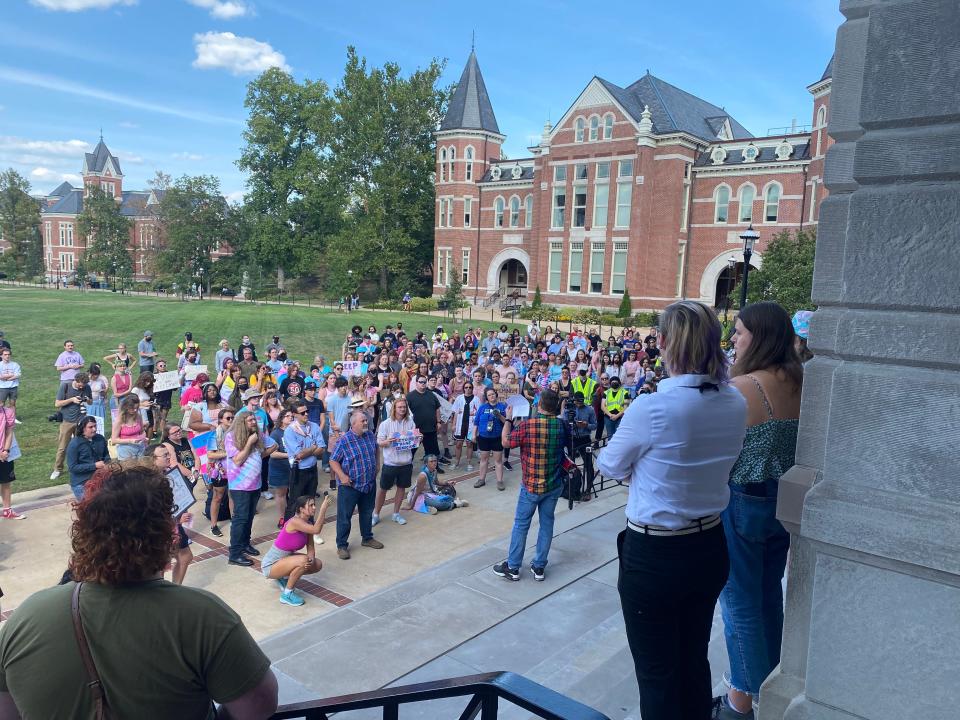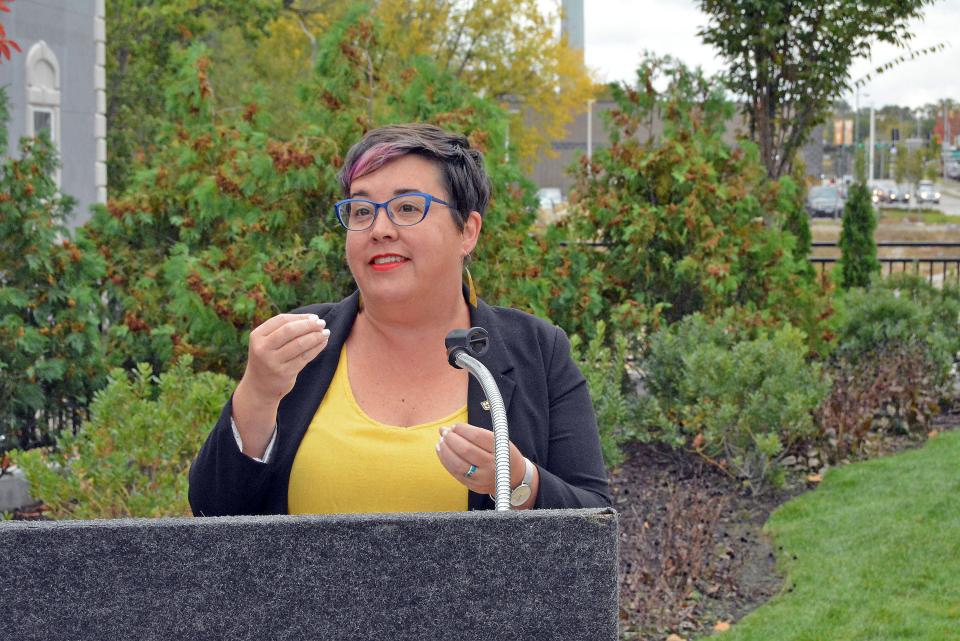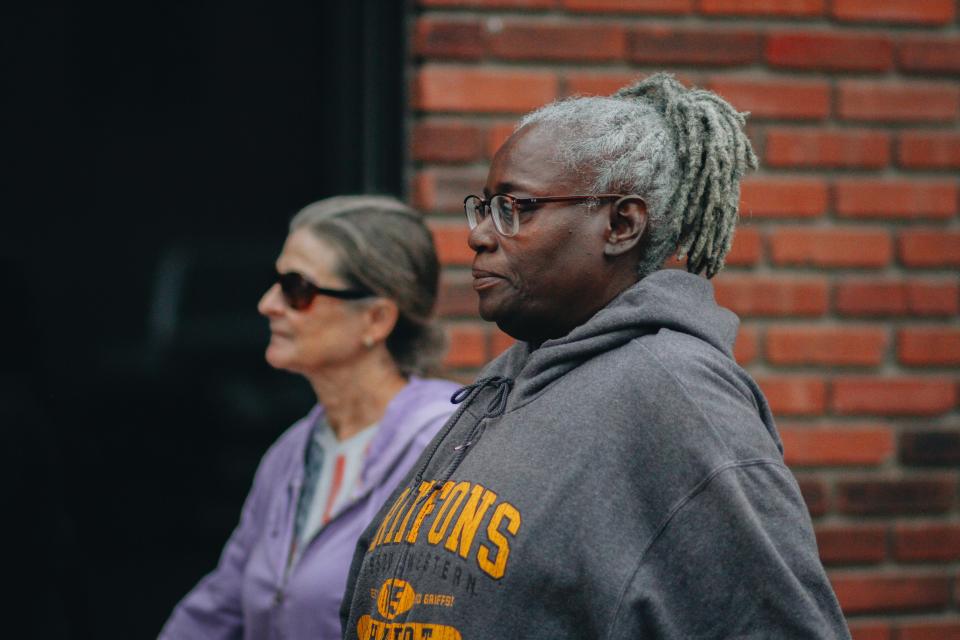Politically, Columbia is 'a blue island in a red sea.' Experts weigh in on why
Columbia avoids book bans, elects Democrats and supports abortion rights and LGBTQ+ rights.
"The city of Columbia is really a blue island in a red sea that goes 100 miles in any direction," said Terry Smith, political science professor at Columbia College. "Boone County is a purple island in a red sea."
The presence of the University of Missouri is cited as the key reason by Smith and others.
"I think what's going on is the University of Missouri in Boone County is a major reason why Boone County is the way it is," Smith said.

Associated with that is the fact that Columbia has the highest percentage of people with bachelor's degrees in the state. The July 1, 2023, population estimates from the U.S. Census places the percentage with bachelor's degrees or higher at 55.3%, where the state's percentage is 30%.
Another measure using only adults with a bachelor's degree from 2019 census data placed that percentage at 44%, still the highest in the state.
Democrats might conclude that Columbians are more educated, while Republicans might claim a higher percentage of the population is indoctrinated.
MU welcomes all perspectives, said spokesman Christian Basi in an emailed statement after being told of MU's impact cited by outside sources.
"The University of Missouri has a positive impact on the state of Missouri and is committed to freedom of thought and expression," Basi wrote. "By welcoming a wide spectrum of perspectives and ideas, we encourage our community to have respectful conversations and debate various topics. As a publicly funded institution, we do not take stances on political topics that do not impact the university directly. Through these efforts, we help the state of Missouri by educating tomorrow’s leaders, finding life-changing discoveries, and bolstering the state’s economy."
![Graduates wait backstage before the University of Missouri College of Arts and Science graduation at Mizzou Arena on Saturday, May 12, 2018. [Hunter Dyke/Tribune]](https://s.yimg.com/ny/api/res/1.2/660o1gb6t_GmKS.bEaxUkw--/YXBwaWQ9aGlnaGxhbmRlcjt3PTk2MDtoPTY0MA--/https://media.zenfs.com/en/columbia-daily-tribune/fa793453238ee9d7c5015e8791a82eda)
When Missouri House of Representatives districts were redrawn after the 2020 elections, they were made to be contained within Boone County. And in the 2022 elections, two House Districts in Boone County flipped in favor of Democrats.
Now four House district are held by Democrats with one held by a Republican.
Kathy Steinhoff, a former teacher and president of the Columbia teachers union, is one of the Columbia Democrats in the Missouri House of Representatives.
"We have top-notch professionals" in Columbia, Steinhoff said. "We have people that are more educated and that tends to draw a more liberal slant to things."
There is support for organized labor, as proven by Boone County having the only library in the state with unionized workers and a contract, she said.
"We have strong unions," Steinhoff said.
There are Republicans, but in Boone County they are the minority party, Steinhoff said.
No books removed from schools, libraries
No books in schools have been challenged or removed. The district evaluates all books thoroughly before they're placed in schools, said CPS spokeswoman Michelle Baumstark.
"Because our district was ahead of the game with a defined process, when other districts across the nation may not have had the same structure in place, we have not had the pushback other districts have experienced across the nation over the last several years," Baumstark wrote in a January email.
The Daniel Boone Regional Library also hasn't removed anything from shelves, though a few things have been moved to another location.
Missouri's switch from purple to red
"Until recently, Missouri was a purple state and a presidential bellwether," Smith said.
Term limits have reduced the number of Democrats in the state legislature, he said.
There were 110 Democrats in the legislature in 1998, where now there are around 50.
"Most of the decline is in rural Missouri," Smith said. "They used to be conservative Democrats, now they're conservative Republicans."
Little Dixie
There's the historical context of slavery that continues as a political undercurrent in Boone County, but it's diminishing, Smith said.
Boone County before the Civil War had among the highest population of enslaved people in the state and was part of what was referred to as Little Dixie, Smith said.
"There's just a touch of the old South in Columbia" among political conservatives, Smith said. "It makes the city interesting. There's a lot of old settler families who are still prominent."
Hub of education and innovation
The mayor is the one person in Columbia who has to be elected by the majority of everyone in the city and the current mayor is Barbara Buffaloe.
"We're a progressive community and hub of education and innovation," Buffaloe said of the political and social climate.
Having MU central to the community has more impact than solely on politics, she said.

"You're also bringing in cultural activities and people that are more open-minded and future-minded," Buffaloe said.
She attended a recent meeting of Regional Economic Development Inc., or REDI, where information was shared that Boone County has more college graduates than 97% of counties in the country, she said.
"It's communities with an educated population that are innovating and investing in new technologies and change," Buffaloe said. "Those communities have a different way of thinking and trying stuff that might not work. We know how to try new things."
It's tempered by common sense, she said.
"We are still in Missouri and still in the Midwest," Buffaloe said. "We very much have a common sense practicality."
It's not useful to boast, she said.
"Because we're in Missouri we want to do this in a way that's not drawing too much attention without trying to explain the process," she said about innovations.
There's always a good chance she and other decision-makers will encounter someone at the grocery store to whom they will have to explain their decisions, she said.
Progressivism is force for change
Andrew Reeves, political science professor at Washington University in St. Louis, has conducted research on the rural-urban divide in politics. He also credits MU for the political climate here.
"Larger cities are fronts of new ideas," Reeves said. "There happens to be a university there, so even more so."
Those with higher levels of education also vote Democratic more often, Reeves said.
Smith agreed.
"I think it contributes significantly," Smith said of the education level of residents. "The Democratic Party is becoming nationally the more educated political party."
"Progressivism is a force for change," Reeves said. "Often these progressive ideas are happening in the context of a university."
Arts and culture also are part of the progressive ideology in university towns, Reeves said.
Protests sprang up in Columbia after the police killing of George Floyd in Minneapolis in 2020. Roy Lovelady, one of the protest leaders, has now been elected to the Columbia City Council.

The US. Supreme Court's overturning of abortion rights also drew local protests.
Columbia is different from other Democratic cities like St. Louis and Kansas City in that it's not really a commuter mecca like those cities, Reeves said.
"It's bringing people to central Missouri from all over the world," Reeves said. "It does have an impact on why it's so blue."
The redistricting also split Columbia between two congressional districts, both held by Republicans.
"That was by design and intent," Smith said. "In a Democratic surge election, they did not want Boone County to be the tipping point in a congressional election."
Though MU is a dominant force, Smith said Columbia isn't a company town. The economy is diverse with health care, insurance and manufacturing industries.
"I think Columbia is seen as a good place to live," Smith said. "It's a reason it's growing. People are pretty culturally and socially satisfied."
Roger McKinney is the Tribune's education reporter. You can reach him at rmckinney@columbiatribune.com or 573-815-1719. He's on X at @rmckinney9.
This article originally appeared on Columbia Daily Tribune: Columbia's political, social climate influenced heavily by Mizzou

